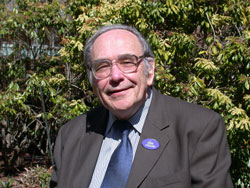2007 Capute Award Recipient: Allen C. Crocker, MD, FAAP
February 20, 2008
This article was written and originally published by the American Academy of Pediatrics: The National Center of Medical Home Initiatives for Children with Special Needs.
Dr. Frederick Palmer's remarks on Dr. Crocker receiving the Arnold J. Capute Award
 |
Dr. Crocker is one of the fathers of interdisciplinary care for children with developmental disabilities. Allen is a graduate of MIT and then Harvard Medical School. He completed his pediatric residency at Children's Hospital of Boston and has remained there for his entire career with appointments to the faculty of both the Harvard Medical School and School of Public Health. Allen is widely known for his leadership of the Developmental Evaluation Clinic at Children's which he has directed since 1967. But his interest in developmental disabilities extends much further back. Dr. Judy Palfrey in her nomination letter states that "at Children's Hospital, Dr. Crocker's name is practically synonymous with Down Syndrome since he has cared for children with this disorder over 50 years." He is, she states, "much beloved by families from throughout New England for his commitment and loving care for the children whose citizenship he has fought to protect and whose opportunities he has labored to ensure throughout his life."
Dr. Crocker's Developmental Evaluation Clinic remains the heart of one of the initial MCHB-sponsored LEND programs, and a national model. In that setting Dr. Crocker and his colleagues have trained countless professionals across many disciplines. These graduates are among the leaders in our field. Dr. Crocker's contributions in advocacy are astounding. His approach is gentle but unwaveringly persistent; scholarly but always accessible; rigorous but approachable. I have seen this in his contributions to the development of the network of LEND programs and what is now the Association of University Centers on Disabilities which he served has president in the 1980s. But he has provided similar leadership to dozens of non-profit entities, state agencies, professional organizations and university task forces. Of note to this audience, he served the Massachusetts Chapter of the Academy as Chair of the Committee on the Child with Disabilities for 11 years and as President of the Society for Behavioral and Developmental Pediatrics.
Dr. Crocker has been a tireless advocate for the prevention of disability and particularly its secondary and tertiary effects on function. (He would be especially interested in today's session on measurement of function.) He worked in the late 1980s and early 1990s to develop a comprehensive schema of indicators for evaluating the effects of prevention efforts in childhood disability.* He called the items the "Fateful 43" because of their close relationship with critical child outcomes. This list of sentinel indicators is worth reviewing today.
Dr. Crocker's co-edited texts, Developmental-Behavioral Pediatrics and Medical Care for Children and Adults with Developmental Disabilities are on the shelves of many of us here today. I want to read a few sentences from Allen's overview chapter in the latter volume:
"To be involved with a developmental disability is a life-long adventure. There are personal implications and service components in each of life's stages. We have not yet found the way to naturalize the process, but grace and redemption can be felt during many moments along the trip. It is particularly rewarding when this is achieved for the aging population by those who love them."
On behalf of the Council it is a personal pleasure to present Dr. Crocker with the 2007 Arnold J. Capute Award.
Congratulations Dr. Crocker!
*Crocker AC. Data collection for the evaluation of mental retardation prevention activities: The fateful forty-three, Mental Retardation, 30:303-317, 1992.







